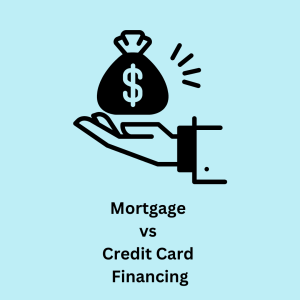
Mortgage interest and credit card interest are compounded differently, and this impacts how much interest you end up paying over time.
MORTGAGE INTEREST
1. Frequency of Compounding
Mortgage interest is typically compounded monthly, although some mortgages may compound interest more frequently (such as daily or annually) depending on the terms of the loan agreement. The compounding frequency determines how often interest is recalculated and added to the outstanding balance.
2. Principal Reduction
With each mortgage payment, a portion goes towards reducing the principal balance owed. As the principal balance decreases, the amount of interest accrued on the remaining balance also decreases. Over time, this can lead to a gradual reduction in the total interest paid, especially as the loan approaches maturity.
3. Lower Interest Rates
Mortgages generally have lower interest rates compared to credit cards because they are secured loans, meaning they are backed by collateral (the property being purchased). This lower interest rate, combined with the longer repayment period of mortgages (often 15 to 30 years), can result in lower overall interest costs compared to credit cards.
CREDIT CARD INTEREST
1. Frequency of Compounding
Credit card interest can be compounded daily or monthly, depending on the terms of the credit card agreement. Daily compounding means that interest is calculated and added to the outstanding balance every day, which can quickly accumulate if the balance is not paid off in full each month.
2. High Interest Rates
Credit cards typically have higher interest rates compared to mortgages, often ranging from 15% to 25% or more, depending on the cardholder’s creditworthiness and the type of credit card. This higher interest rate, combined with the shorter repayment period (usually requiring minimum payments each month), can lead to significant interest costs over time, especially if the balance is carried over from month to month.
3. No Principal Reduction Requirement
Unlike mortgages, credit card payments may not necessarily reduce the principal balance owed. If you only make the minimum payment required each month, a significant portion of your payment may go towards paying interest rather than reducing the principal balance. This can result in a cycle of debt where the outstanding balance continues to accrue interest, leading to a larger total amount owed over time.
In summary, while both mortgage and credit card interest can be compounded, mortgages generally offer lower interest rates, longer repayment periods, and a requirement for principal reduction with each payment, which can result in lower overall interest costs compared to credit cards, especially if you carry a balance on your credit card from month to month. There are options such as Refinancing OR Home Equity Line of Credit. For more info, contact, Treasury Funds Home Loans, Inc.
